Issue No.14 / September 16-30,2015
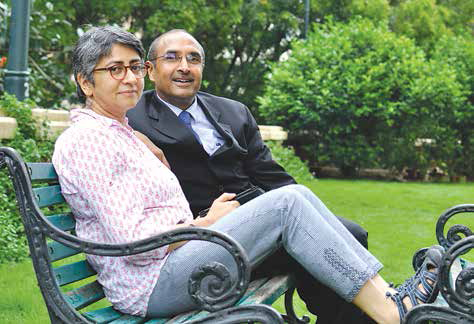
Yogi Sriram, Senior Vice President, Corporate HR, Larsen & Toubro also served as Senior Vice President of Human Resources at Taj Hotels Resorts & Palaces. Sriram has over 38 years of experience in Human Resources Development. He has led the HR function in Asea Brown Boveri Limited. Before joining Taj Hotels Resorts and Palaces, he was the HR Director (Africa, Middle East, Turkey & South Asia) with British Petroleum. He served as Senior Vice President ¬Human Resources of Indian Hotels Co. Ltd. until July 2007. After schooling at DPS Mathura Road, Sriram got a Bachelor’s degree from Shriram College of Commerce, New Delhi, Master’s in Personnel Management & IR from the Tata Institute of Social Sciences, Mumbai, an L.L.B. from the University of Delhi and an M.B.A. in Organisation Behaviour from the Faculty of Management Studies (FMS), New Delhi. He also has a Diploma in Training and Development from the Indian Society for Training & Development and has been conferred with Fellow of the All India Management Association.
His charming wife, Sujata is currently an Associate Professor and Dean in the School of Human Ecology, at Tata Institute of Social Sciences (TISS), Mumbai. She has a Doctorate in Child Development and Psychology, and earlier served as faculty at Lady Irwin College, University of Delhi. She was awarded the prestigious Fulbright scholarship in 2010-11 for carrying out research at the University of California in San Diego. Some of her research areas are on issues such as identity, happiness, selection of marriage partners, religion in the life of families and children, social networking. She is also part of a team at TISS which initiated a psycho-social helpline called iCALL that provides counselling on telephone and email for people in psycho-social distress. She has done stints of research in the Norwegian University of Science and Technology at Trondheim, Norway besides making presentations at the Berkman Center of Internet and Society at the Harvard Law School. Corporate Citizen meets this lively and intellectual couple, whose humour running rife in their veins makes for a happy and contented marital life.
We not only celebrate our differences, but are also ready to talk about them, in order to maintain a healthy marital relationship
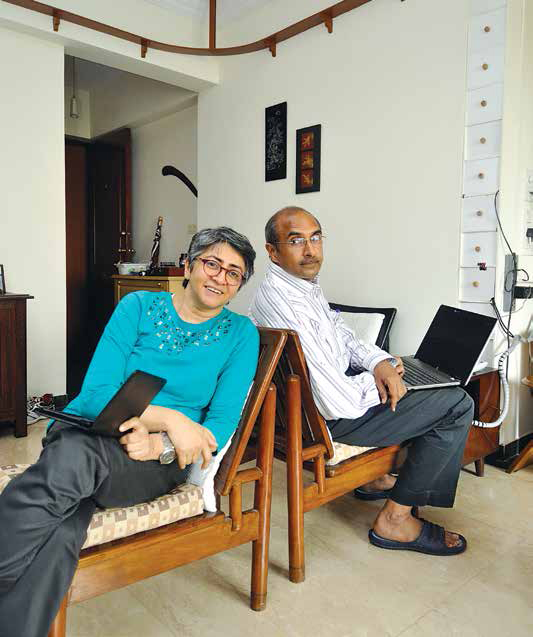
Despite wondering whether Sriram loved his bullet mobike more than her, and despite the arrogance which she says was writ large on his face when she first met him, Sujata not only fell in love with Sriram but decided to tie the nuptial knot
So, how did she meet him? Says she, with a smile, “Yogi’s sister was my professor in college and Yogi was working with NTPC at that time. He had just finished his LLB
Both of us met in Delhi. I was staying at the Lady Irwin College hostel. I was finishing my Masters at the time we met. Yogi’s sister and mother used to live together on the campus and I got friendly with his sister. I used to meet him occasionally when he came to visit them. The first time I met him, I had gone to run an errand for his sister. He was literally looking down his very prominent nose, at me. I thought, who is this guy, and what’s he doing here. What does he think of himself ? It was then that I learnt that he was my professor’s brother,”
He has a room full of HO/OO trains... it is very important to have a hobby because one of the main problems of corporate life -- especially with technology -- is that work never really stops
Says Sriram, “She had a rare combination of beauty, brains and everything. It took me a long time to make a decision because I cherished my independence. When it came to push-comes- to-shove and making the final decision, she was quite assertive. She said you make up your mind one-way-or-the-other. And that’s how it happened and we tied the nuptial knot after two years of courtship.”
As for Sujata, she says, “I always felt he was extremely arrogant. Definitely there were feelings of irritation, but at the same time, yes, he looked nice. He had a lot more hair than he has now.” They got married in May, 1984. Reminisces Sujata, “After I finished my viva at 4 pm, I had to get ready for the engagement at 6 pm. Since it was a South Indian style of function, it was expected that we would have a very grand engagement ceremony.”
However, soon after marriage, Sujata was to find out that she was not his first love – it was his 350 cc Enfield Bullet motorcycle! Narrates Sujatha, “Pretty soon after we got married, we had gone for a movie on the bike in summer, in Chanakyapuri. After the movie we found that the bike had a puncture.” Butts in Sriram, “I didn’t want to leave it there, so we walked home with the bike for 8 kms and I asked her to push it. I kept motivating her and that’s how we learnt the art of motivation,” he chuckles, further adding cheekily, “I was very fond of it, even more than her.
Narrating another incident, Sujata states, “On another occasion, we had gone for a movie on the bike in October when the weather in Delhi changes very suddenly. It takes just one shower to make the weather cold. I was riding on this bike and I remember the colour of the shirt I was wearing - it was blue. It was silky in texture and I didn’t have a coat or anything else. And this guy was zipped up right to the top in his padded jacket. I was freezing and he did not even offer me his jacket or anything else. Even behind his fairly considerable self, I really didn’t have much protection.”
He also had another love, reveals Sujata and that was the 1964 two-door model Standard Herald car. Says she, “I learnt to drive that car and every time I went out on the road, I was respectfully given way by everybody, because they were worried that the car would stop and there would be a traffic jam. Once, we were going over a flyover and while coming down it, I noticed a wheel on the side and just as I was wondering whose wheel could it be, suddenly our car went down. I then realised......’’
Yogi adds the punchline, “I told her that the car runs on will power and not on petrol. From the rear side the car looked like a duck, with both the tyres going inward and when there were enough people sitting, it would sort of straighten up. The bonnet used to fly open unpredictably in the middle of the road. It had petrol power, horse power, will power and also woman power because she has pushed it many times to get started.’’
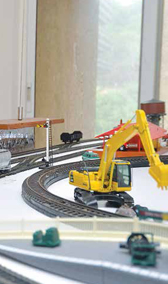
That the families were not strangers to each other was revealed after they met. Says Sujata, “My grandfather was a public health official and Sriram’s dad was also in public health. It turns out that my grandfather was a mentor to his father.
That is an old story which probably helped my mother-in-law look at me more affectionately. I was a good South Indian Brahmin from a service class family and best of all, the granddaughter of Dr. Adi Subramanian, who was, after all, a mentor for Sriram’s dad. When I talk to my mother about it, she keeps telling me stories of how Sriram’s dad was very well known in the public health service.'
“On our honeymoon too we fought like crazy,’’ confesses Yogi. “We went to Kausani, near Nainital. From Nainital we took one of those UP tourism buses. I am a frugal holidayer. I decided a cost effective holiday, instead of wasting money. She and I were clad in jeans and T-shirt and carried backpacks. I made an advance booking with Kumaon Vikas Mandal Nigam (state government motels), which has smart basics and nothing else. Then we went to Raniket and just above one can walk to a place called Chaubatia, which has a fruit garden. There we had a wonderful time. We visited the Kumaon Regiment and then went to Kausani, a famous summer resort. My good wife developed viral diarrhoea because of the wheat grain.”
Elaborates Sujata, “It is a fungus that comes on the freshly harvested wheat and it causes very severe stomach problems. I was afflicted by that and there was this doctor who treated us, who was on his way to the US.’’
Adds Yogi, “He gave us some sulpha tablets from the local dispensary, but we walked a lot after she got better, which was in a day or so. We had a lot of arguments on what is hygienic and what is not. I was a very fastidious person and still am. Just like when I came in I did not shake hands because I had to wash my hands. So everything has to be washed and cleaned.”
Yogi: One, celebrate differences. I represent extraversion, intuition, thinking, judgment (ENTJ) type of personality and she is a introversion, intuition, thinking, perceiving (INTP) type of personality. ENTJ is a very structured, assertive person, referred to as life’s natural leaders. So normally if you open my cupboards, they are kept in a proper order, and says Yogi “if I have to find something, I am so structured that I cannot find it immediately without the help of a INTP!”
Sujata: Essentially when you talk about extraversion, that is where you get your energy from. Do you get your energy from outside or do you derive it from within you. He gets a lot of energy from the appreciation and applause he gets from work. For me, I need to get it from within. I get exhausted when I am surrounded by too many people, when too many things are happening outside – then I need to get into my own self.
Yogi: So, we are totally different personalities, but we have adjusted with each other. For example, if we go on a holiday, invariably we have arguments every day, about where to go or what to see. I like to check it out in a structured way - we have seen this, we have seen that -- but she likes to wander off on an unchartered path. That’s her own way. I recognize that, so sometimes we do our own thing. I may go to a particular type of shop, based on a hobby that I have, and she goes off somewhere else, but we meet shortly after that.
Sujata: The other issue is, it’s not just about celebrating the difference, but also to be ready to talk about it, in order to maintain a healthy marital relationship.
Sujata: He is into Scale Model trains. He has a room full of HO/OO trains and the sides of our ceiling in the living room have a rail track. It is very important for one to have a hobby because one of the main problems that comes with corporate life -- especially with smartphones, computers, laptops and Wi-Fi -- is that work never really stops - your work hours just continue, even if you have come back home. You get on to emails or Skype calls or something else. At least his hobby helps him switched off from work and move on to something else which gives a lot more intrinsic satisfaction, than just work. Otherwise it can become monotonous.
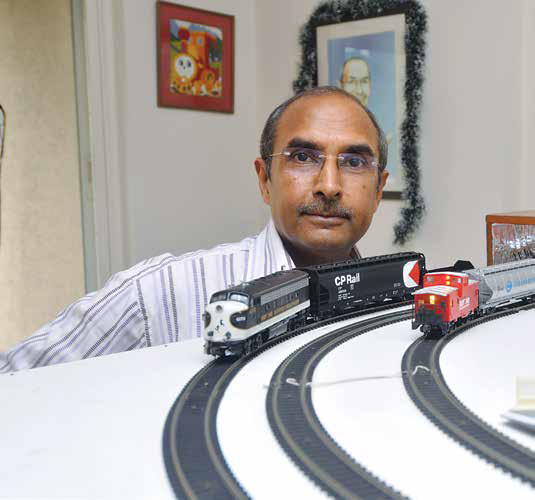
“Here you are engaging the mind, the hands and the eyes. When you engage three things together, you are in unison and get quite engaged in what you do. That is the good part of this hobby. And finally the product that comes out is aesthetically very beautiful. It’s a miniature train, with miniature lighting, and you have little people inside the train, so it’s a good way to be engaged. For me, life is like a journey, therefore trains are very important.’'
Yogi: Yes, I too believe that for a successful marriage, both the spouses should pursue a hobby. Sujata is very passionate about reading, so she got her second Kindle, after she lost the first one. She keeps reading and once in a while she plays mah-jong on her PC.
Sujata: At the time I joined TISS, I joined the Unit for Family Studies -- researching on issues relating to families. Much of what I am doing right now – setting up this counselling centre and helping set up telephone counselling helplines -- came from the push from the institute itself, very specifically, the directions given by the Director. I have also worked on issues of employability and multiple other issues. One of the great things about TISS is getting the opportunity to explore other avenues. In the process some of my colleagues and I got started with this masters programme in counselling. We keep talking about people getting stressed. But people do not know whom to approach, what kind of help to access. Psychiatrists are few and far between in this country, and psychiatrists here prefer to medicate rather than talk. So we thought, why not start a programme where we can train people to become counsellors. That was in 2009 and from that time we have haven’t looked back. We now teach two MA programmes in Psychology, and are planning an MPhil programme as well.
There are a lot of areas like engineering design, where we would be very happy to have women. Frankly, it means, more stability. Women prefer to be in the same setting, while men tend to change settings - Yogi Sriram
Sujata: A couple of studies I worked on looked at selection of marriage partners and what people look for in marriage partners. We have to recognize that in India, arranged marriages are still preferred by the young generation. Your parents have done the initial proposal making, and after that you get to know each other, and then the marriage happens. It still continues that way, because ultimately it’s always convenient for the young couple to have somebody to fall back on. If the marriage does not succeed, who can you fall back on? This way it ensures family support. Families can’t turn back and say, you have chosen your own partner, so you go your own way.
Yogi: In my case, I did this one month course on counselling at St. Xavier’s Institute of Counselling. I was GM, HRD for ASEA Brown Boveri (ABB) in the early 90’s. It’s not an easy course to get into. It was a full day course and you could not miss class. I requested my management to nominate me, which they did. That was my connection with counselling. Ever since, I use the principles when I need to, in a different setting and context. Sujata works more with people who are distressed. Mine is a mixed bag. This course helped me with performance appraisals. It helped me in training people, using the techniques, not to jump straightaway into advising. The first thing that the course teaches you is to label a feeling, so that you understand the other person better and stimulate the other to talk. All those principles helped a lot.
Yogi: There is too much hype about cultural sensitivity. It is best for people to be what they are, but to be aware of other cultures. To try and clone other cultures is a bad idea. This whole myth of the proverbial global manager is not correct. You can learn one culture, perhaps master one culture that’s your own. Supposing there is a Gokulashtami event, maybe you are unable to really explain to a foreigner as to why people climb the human pyramid to break the pot. But all of a sudden if you try to celebrate Halloween, it sounds phony. Firstly master your own culture, second, read about others’. I think food is a very good way to learn about other people’s culture.
Sujata: Be aware of another culture, prepare to accept the fact that the other culture has things you can learn. Otherwise we often see Indians viewing other cultures as threatening, as something that is not good for you, or subversive. This gets exaggerated if you have children living in another culture.
Yogi : I can cook, but I cook in a scientific way. For example if I have to make a chapatti, I will take a katori and shape it out (he chuckles). Adds Sujata, “And somebody else has to do the cleaning up.’’’
“Jokes apart, we are very particular about what we eat. For many years in my life my wife fed me with a fantastic concoction. It came in a container which was long and had an airtight lid. It was a smoothie made of curd, pomegranate, flax seeds, apples, seasonal fruit, grapes, raisins and walnuts. It was a very powerful concoction - it was called brain food in the house. I used to look forward to this meal at about 10.30 a.m. She cooks well, and has a flair for making balanced food. I can’t consume wheat, because I have gluten allergy. On my birthday this year, Sujatha baked a cake with rajgira, which was very nice.
Sujatha: I started to innovate and to experiment to make wheat-less and eggless cakes.
Yogi: In the beginning, our son, Krishna was looked after by Sujata’s parents who were in Delhi. We were really lucky.
Sujata: In other ways we tried to be consistent, in the sense, if he said something, I wouldn’t contradict it. That is very important but most parents forget. They start up a squabble in front of the child, and that’s how the problem starts. Our children are clever, they can really find out where the power lies and how to use that power very tactfully and then play it against parents.
Yogi: Incidentally we are three very different personalities. Krishna is an ENTJ like me but quite different. He is very technology oriented, with mechanical and bio medical engineering. He has a Doctorate from California and is now busy with post-doctoral research in Southern California.
Sujata: As a working woman, I definitely didn’t feel guilty at all. I never felt I deprived him of anything by going out to work. My working meant that my mind stayed active. And I was not an inadequate caregiver for him. I was also very particular that once I got home, it would be family time. Weekends were very important in terms of all the scheduling of activities with the child.
Yogi: Secondly, whatever you practise as parents is normally learnt by the child. In our case our son is very hardworking, and both of us are hardworking. The next is frugality - he is quite frugal and spends his money very wisely.
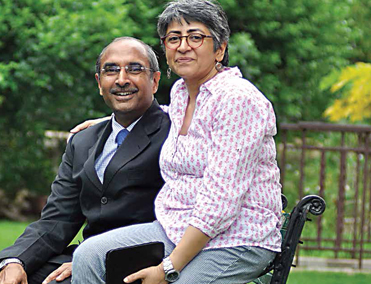
sIn a corporate body, we have to be careful. We encourage such entries in certain vocations like auditing, some aspects of finance, etc. We don’t have flexi timings for the second career option inductees, but we provide facilities that are required for a lady employee, for example safe travel while returning home.
A little over 30 per cent of our equity is owned by government organizations like UTI, LIC, GTI, etc. They have women director representatives, at least one from these organizations, so we fulfil the quota. Even at the leadership level we will be very happy to have women. There are a lot of areas like engineering design, for example, where we will be very happy to have more women employees. Because, frankly, it means a lot more stability. Women tend to like to be in a more stable setting, while men tend to change. These days we have fantastic women engineers and some of them are doing much better than men.
Yogi: It is important first of all to love your job, to love your role. Your role is very important. If you learn to love your role then automatically your tendency to jump the job will be less. Which means that it has to be the patient accumulation of successes. This quick hit, quick win kind of thing won’t work - usually it does not work. To make an impact in any job it takes minimum four to five years. To make a change in HR or any field, one has to have patience to see through that change, to decide whether that is the right cup of tea or not.
Sujata: Unfortunately in the Indian sociological milieu there is too much of a tendency for parents to compare. Achhi naukri means it has to be a particular type of job or bringing a particular amount of money. There is still this stereotypical understanding of what a good job is. The comparison is not only with your neighbour’s kids but also within the family. It is not only in the work sphere, it starts right from school, in terms of what stream you take, what scores you bring, etc. In India, today, young people are in a hurry. And you don’t have the time to stand and think about what you want to do, because if you stand to think somebody will knock you down.
On our honeymoon, we fought like crazy. even now, if we go on a holiday, invariably we have arguments every day, about where to go or what to see
Sujata: Live life to find your happiness. If you look at the happiness index, India is a very unhappy country. Somewhere, we need to look inside, within ourselves, and look at how we can become happier. It also means that you must find out what you are good at, learn how you can adapt to your environment. Very often we expect the environment to adapt to you.
Yogi: Learn and learn more. There is not a day about which I feel satisfied if I have not learnt. There may be a particular day when you spend a lot of time with people, then learn from them. There may be a particular day when you spend time on the computer, so learn from the computer. So whatever you do, you learn, learn, and learn. Secondly, be happy with yourself. And lastly be yourself. If anybody has to describe me, they may say I am a very distinctly different person. But I don’t want to be different for the sake of being different. I am myself. It is very difficult to put me back to what people call the ‘norm’. I am not the norm.
By Vinita Deshmukh